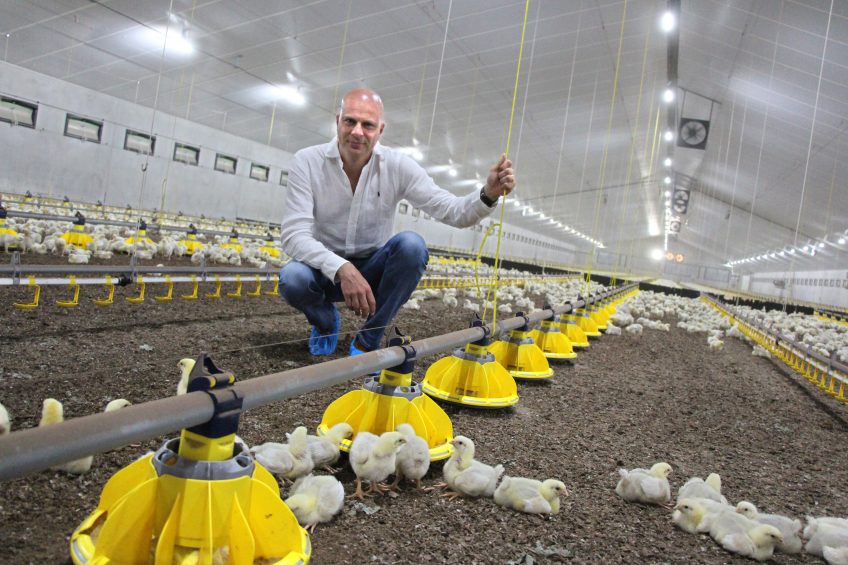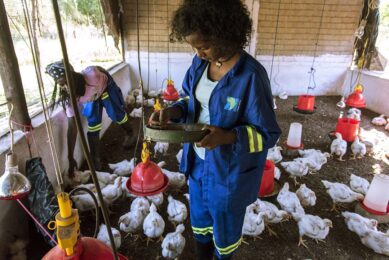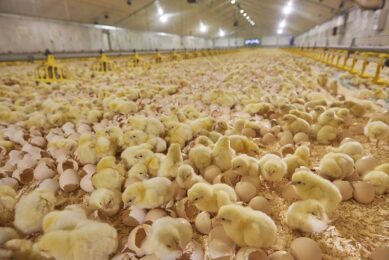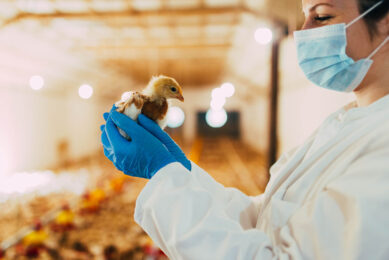Effective natural alternatives to antibiotics

Over the course of two decades the European Union has learned to produce poultry meat without the use of antimicrobial growth promoters (agp’s). Nowadays producers around the globe must get ready to adapt to new local regulations, according to Nutriad-CEO Erik Visser.
Multinational feed additives producer Nutriad, headquartered in Belgium, provides natural alternatives for AGP’s. Erik Visser is CEO of Nutriad since 2010. “Nutriad delivers products and services to over 80 countries, supported by four application laboratories and five manufacturing facilities on three continents,” said Visser.
“Working with feedmills, integrators and farmers across the world allows us to understand the global issues thoroughly.” One of the drivers for Nutriad’s growth is the increasing demand for alternatives to AGP’s. More and more countries worldwide are restricting the use of antibiotics, and pressure from consumers is also forcing producers to evaluate alternatives that still allow for an efficient production of healthy animals. New regulations have recently been introduced or are expected shortly in the USA, Vietnam and Indonesia. Thailand, Australia, New Zealand and China have introduced certain measures or announced to do so shortly.
Visser sees how the recent increasing concerns on antibiotic resistance in humans, and its impact on public health, has accelerated the restrictions being put forward. When the use of antibiotics is restricted, however, cost effective alternatives to control pathologies, such as AI and PED, are needed. Visser: “Antibiotics provides production certainty to producers at a limited cost. As alternatives in general are more expensive, we feel that it is important that consumers pay a fair price for their chicken meat, allowing farmers to still generate a reasonable income.”
Health most dominant
The main challenge when restricting the use of antibiotics and banning the use of AGP’s, is how to deal with the fact that the animal becomes more vulnerable to certain diseases. Visser: “Now that many farmers operate in countries that are facing changing regulations, we see an increasing demand for our products.” Visser explains that the challenges might vary per continent. The USA for example is concerned about biosecurity practices, programmes and defence against HPAI (Highly Pathogenic Avian Influenza).
Having suffered from several outbreaks in early 2017, keeping flocks healthy whilst adapting to the recently introduced Veterinary Feed Directive (VFD) has created a challenging environment. In Latin America the industry seeks to remain free of main diseases as Avian Flu and to maintain a strict Salmonella control. Also in Latin America an increasing pressure on the reduction of use of antibiotics is seen. In Asia, governments are seeking a rapid introduction of new regulations, however as experiences in the EU taught us, it takes time for the industry to adjust to a new scenario.
As long as the use of antibiotics is not restricted, alternatives continue to be unattractive for producers, since they lead to an increased production cost. According to Visser: “A lack of knowledge on implementation of alternatives and deficiency in farm hygiene, motivates continuation of existing practices. Another problem is when birds suffer from low quality raw materials used in feed formulation, driven by a desire to reduce costs. A more balanced consumer pricing would allow producers to invest in nutrition and health, even eliminating use of AGP’s.”

Human resistance to antibiotics is not the only concern, as consumers also increasingly focus on food safety. Prevention of foodborne disease is also high on the agenda of companies like Nutriad. Stated Visser: “We have increased our research budget to test effectiveness of our products on Salmonella and Campylobacter, with promising trial results.” According to the Nutriad-CEO antibiotics will never completely disappear from the animal sectors, it will always be used therapeutically. However, the use of antibiotics will be more and more restricted and controlled. In addition to combinations of natural resources also good farm management and hygiene management are crucial in achieving good results by producers. Visser: “There will be no single ‘quick-fix’ product to replace antibiotics, whether they are applied as growth promoter, or as a veterinary drug. In fact, lower antibiotic usage on farm requires implementing an entire strategy that entails biosecurity, feed quality and efficacy, and animal stress management.”
Nutriad at a glance
The main product groups of Nutriad include Digestive Performance, Palatability and Mycotoxin Management. Digestive Performance includes products like Adimix, Sanacore and Apex. Visser: “Our Adimix product range is based on sodium butyrate. Nutriad is a pioneer in this field. Recently the EU concluded an independent research of products against Campylobacter jejuni, which amongst others included Nutriad products. Our Adimix came out on top.” Apex is the brand name of a range of natural botanical ingredients that improve intestinal function and balance intestinal microbial activity. It provides a great alternative to AGP’s.” Nutriad’s Palatability portfolio, based on flavours and sweeteners, includes products like Krave, Maxarome, Optisweet and Gusti.
Palatability products help nutrition happen, as they stimulate feed intake at challenging moments in the production cycle. The Mycotoxin Management includes products as Toxy-Nil and Unike-Plus. This last product focuses on binding and inactivation of mycotoxins as well as reduction the negative impact of mycotoxins in animals by organ protection, immune system stimulation and support of antioxidant system. Nutriad-CEO Visser sees the most potential in combining various natural additives: “A great advantage of using natural additives is that selective pressure against these substances is minimal.”
Across the globe, Nutriad provides customers with local species expertise, supported by product specialists from headquarters. Visser: “We don’t just offer the products, we have a personal relationship with our customers and work closely together with nutritionists and veterinarians to develop solutions for their particular challenges in their particular production environment.”
Join 31,000+ subscribers
Subscribe to our newsletter to stay updated about all the need-to-know content in the poultry sector, three times a week. Beheer
Beheer








 WP Admin
WP Admin  Bewerk bericht
Bewerk bericht